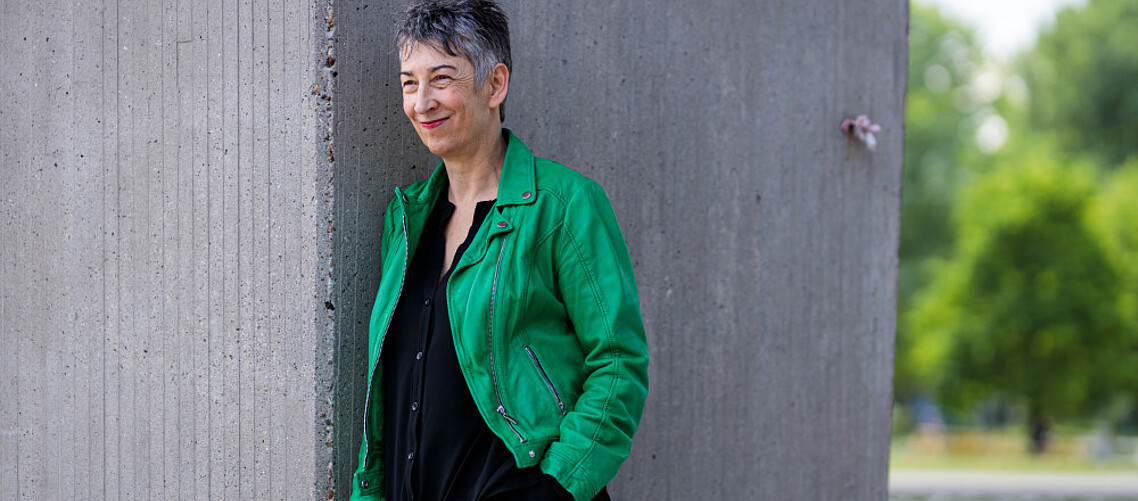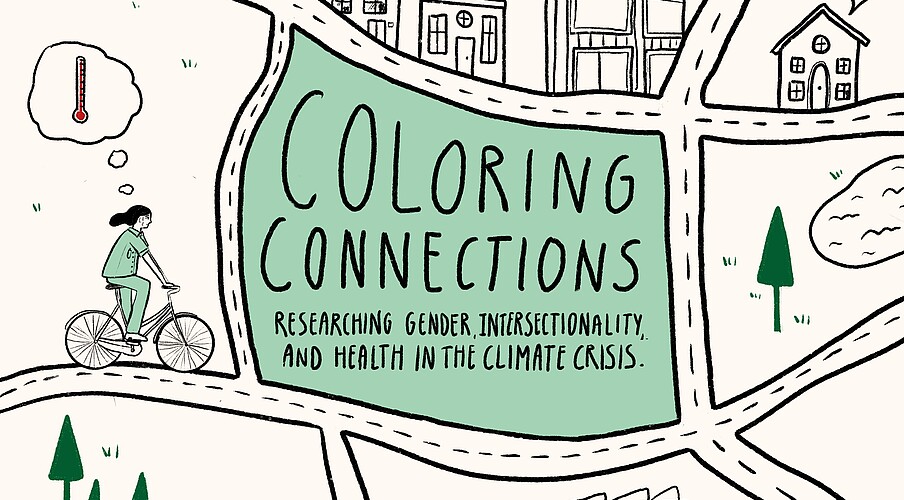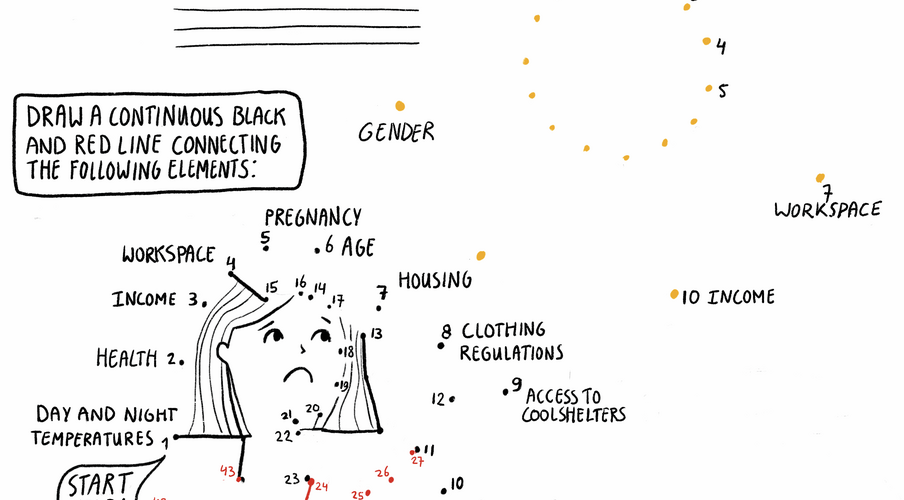When Dr. Petra Verdonk began moving from academia to focus on her own agency as a place for training, consulting and research at the intersection of gender, intersectionality, health and the climate crisis she called it Beyond Boundary.
The name is more than apt for someone who has consistently demonstrated her appetite for moving in different, innovative and creative ways to truly make an impact with her life and work. A recent example of this is Coloring Connections, a creative colouring book that she edited and which provides researchers with background information, case studies and assignments focused on integrating gender and intersectionality into health research, amidst the climate crisis.
For more than two decades, Verdonk – who trained as an occupational and health psychologist and has a PhD in sex and gender in medical education – worked at a number of institutions, including Maastricht University and, until early 2025, Amsterdam UMC. There, her most recent role was Associate Professor in the Department of Ethics, Law & Humanities where she conducted research in the area of gender and diversity in health and healthcare as well as pioneered developing education from a diversity perspective.
No casual activist
Throughout her working life, Verdonk has been propelled by an urge to contribute more broadly to the areas of society that she believes are crucial for everyone and every creature to thrive.
She co-founded the Dutch Society for Gender & Health (NVG&G), where she still serves as secretary, and chaired Stichting WAHO, an organisation advocating for young women with work disabilities, from 2001 to 2007. She was also a board member of the Women’s Union (FNV Vrouw, 2008–2016) and is currently an advisory board member of the Tijdschrift voor Genderstudies. Among other roles, she oversees the publication’s scientific quality and anchoring, advises editors and identifies relevant developments in feminist theorising and gender studies. Verdonk believes that the climate crisis is the largest and most comprehensive public health crisis there is and that it hits women and other people harder than men. As a climate activist with Extinction Rebellion, she co-founded the Dutch community XR Zorgprofessionals and, while still at VU University, she successfully campaigned to end research collaborations with the fossil fuel industry
But Verdonk is no casual activist.
Indeed, taking an active role in changing society for the better was something that had been instilled in her from childhood. The middle sister of three girls, she grew up with parents who were committed socialists and so she had what she calls “strong class awareness” from early on. “My parents encouraged us to do well at school but also never allowed us to think we were a better person than someone else because we had read a book,” she says.
And, in this new phase of her life, she’s not leaving her activism behind: a few days after we met in Utrecht – the city where she obtained her Master degree - she was in Amsterdam chairing the lunch lecture and reading marathon organised with Scientist Rebellion at VU University, in the hall of the main building. It meant she missed being in The Hague where the Mobile Brigades for Inclusive Health Research delegation was delivering the petition she co-authored, ‘Stop censorship in knowledge and care – invest in sex, gender and diversity’, to the Dutch House of Representatives ahead of the round table discussion of the committee on the National Strategy for Women's Health. Among her upcoming commitments is speaking at the upcoming annual Spring Symposium of the LNVH – the Dutch Network of Women Professors - which this year takes the theme, The Engaged University: Frameworks for Academic Activism. Verdonk will be addressing the topic of ‘professionalism’ and the right of academics to speak out, something she believes unwaveringly in.
We spoke to her about Coloring Connections, how gender, health and climate change influence each other and more.
You were clearly interested in gender and health while you were still a student yourself. Your Master thesis was titled, ‘Women: incapacitated or subordinated? An extensive literature study on the higher risk of incapacity for work for women' and you’d completed a BA in complementary medicine before that. Can you recall when the climate crisis came into view for you?
I had always known that there was a limit to this gender first or gender only approach, as important as it is in the area of health where I had been working. And then I got hit by what I would call an ecological epiphany. Until that moment I had a passing interest in what was going on around me as regards the climate - I had been hearing these stories from my husband, who works in organics, about how unusual and severe hailstorms were destroying the raspberry or apple harvests. But in 2018 I went to Australia to visit my daughter who had immigrated there. I left the Netherlands in minus four degree temperatures and it was 36 degrees plus when we arrived. I had also not yet recovered from a bad flu and so it was some kind of perfect storm that rendered me ill – severe headaches, nausea, no ability to retain water. It was so bad I had to see a doctor and it was then that I realised that weather can actually kill. That was definitely some kind of trigger into realising that the climate is breaking down, that no-one has a plan and that I had not been paying attention: like many ecologically aware people of my generation, we believed that because we had got rid of acid rain and that the hole in the ozone layer was diminishing, we were on top of things!
But we weren’t that is for sure. And now you are as firmly focused on the climate breakdown as you are on gender and health. What draws the three together for you?
Inequity. At first I didn’t connect what is happening to the climate to that. I had studied inequity in health issues and in gender but I began to realise that it applies to climate breakdown as well and that all have a big, systemic root cause in imperialism and of course related to that, patriarchy. The idea that you can take whatever you want, that it is infinite and endless and that you don’t have to give anything in return is one that is driving society, and its role in what is happening to the climate is huge.
Coloring Connections developed for researchers dedicated to social justice
Can you share how you believe gender, health and climate influence each other; why it is vital that we think of them as complex but also interconnected challenges?
The Planetary Health crisis – which refers to the combination of climate and ecological crises and their impact on human health – exacerbates existing inequalities, leaving marginalised groups, including women, more vulnerable to its health consequences. It became clear to me that to develop inclusive and equitable responses to today’s most pressing health challenges, driven by the planetary crisis, researchers must explore gender-sensitive and equitable health research. This is why we developed Coloring Connections – for researchers dedicated to social justice, who want to integrate gender and diversity into climate health research.
Do you also see gender, health and climate having the potential to reinforce each other? ECWO believes, for instance, that while women live more often in energy poverty and poorer health, they are precisely the ones who can take the lead or offer innovative solutions for the so-called “wicked problems”?
I believe it was Einstein who said you cannot solve a problem with the thinking that created it in the first place. Audre Lorde would say something about dismantling the master’s house with the master’s tools. I am not much of a ‘women are better persons’ type of feminist, I mean, we have earlier seen Margaret Thatcher at work. We do not need more women in boardrooms. We need to get rid of boardrooms. But I do firmly believe in that we are now facing the consequences of missing perspectives: women’s perspectives, people of colour’s perspectives, indigenous perspectives, etcetera. Women come up with other solutions because they live different lives - as do marginalized groups. They also have different needs, and therefore we have to be creative and triangulate our perspectives. Get rid of the tunnel vision. So yes, we need women in all sorts of roles. People of color. Young people. People with disabilities. You could call it a citizen’s assembly.
What has the response been to Coloring Connections?
People have been responding to it like they were seven years old all over again! Katinka Feijs’ work is just so wonderful, bringing a playfulness and lightness into what is honestly really heavy content. Her design and artwork also provides a counterpoint to the contributions on topics we cover in the book - like Health Inequalities in Heat Stress, Violence and Masculinities, Medical Education and Planetary Health Equity, and Public Policy, Intersectionality, and Healthy Cities. People are really liking the extras that are part of the book, like the question cards for critical reflection training and the different assignments that are included. We are glad to be offering it open source as well (see link at the end of the interview).
Your activism is powerful and palpable. What still drives you?
There’s no turning back for me because this is a marathon and not a sprint, one that goes beyond my lifetime. I feel strongly that it is my responsibility. Capitalism has been good to me on an individual level. I have been able to extract whatever I need. I cannot undo that, but what I can do is ensure that I do whatever I can to prevent things worsening.
And you are now doing that outside the university space, where you have worked for much of your career. What do you bring with you into the new, independent vehicle that is Beyond Boundary?
I'm still figuring that out. Of course I am bringing my academic skills and my knowledge. But I also bring an offer to the younger generation to maybe carry their suitcases for them a little, to support them in finding ways to work in meaningful communities, to become an activist, without losing themselves or their jobs. In medicine especially, I have been noticing that students and younger doctors are being very conformist and very scared of speaking up. But, in fact, they have key positions in society and because of their authority, because of their knowledge, because of their professional networks, they have the ability to change things rapidly, provided they have the courage to do so. I would be glad to support that.
You are a voracious reader, as is evident on the regular links to articles and news items that you share on your LinkedIn. Is there anything that you’ve been reading lately that has really made an impact on you?
The Rise of End Times Fascism by Naomi Klein and Astra Taylor, an essay that appeared in The Guardian mid-April. The essay states that “the governing ideology of the far right has become a monstrous, supremacist survivalism. Our task is to build a movement strong enough to stop them.” I agree and have been observing the rise of the far right for some time. I believe that it is time for us all to become activists, if we are able to. And because we live in a time of social media and the internet, we can find each other more easily than ever before. We must realise that no matter if you are pro-Palestine or a climate activist or working for gender equity in health or for trans rights, our strength comes from working together to create a new system based on justice for all.
Selected images and details of Coloring Connections, featuring beautiful artwork by Katinka Feijs, are below.
Verdonk, P. (Ed.), & Feijs, K. (2024). Coloring Connections. Researching Gender, Intersectionality, and Health in the Climate Crisis. Dutch Society Gender & Health in collaboration with Amsterdam UMC. You can find more information here.


